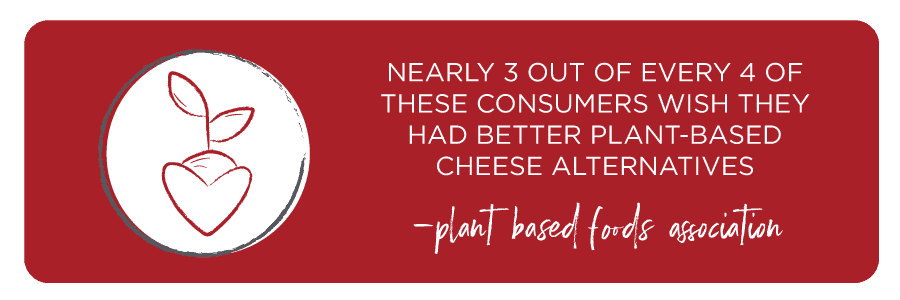“Plant-based alternatives are here to stay — and grow.” The innovations in plant-based food development are driving this change.
This was according to Jennifer Bartashus, senior consumer staples analyst at Bloomberg Intelligence, back in August 2021, as she discussed the long-term potential of plant-based to go from a fad to a viable mainstay in supermarkets and restaurants alike.
Nearly two years later, the numbers are proving her to be correct. The Plant-Based Foods Associations (PBFA) 2022 U.S. Retails Sales Data report showed that plant-based food dollar sales grew 6.6% in 2022 to $8 billion, adding to a three-year growth rate of 44.5% (CAGR 13%). This impressive growth, despite rising inflation and a lack of scale, subsidies, and retail space, makes one thing crystal clear: the demand for plant-based foods isn’t going anywhere anytime soon.

However, this doesn’t come without growing pains. Eager to meet these needs, developers and CPGs end up making several common but unnecessary mistakes. Understanding these misses and how to avoid them lets you focus on what matters most to your consumer: a delicious product.
Miss #1: Taste as an Afterthought in Plant-based Food Development
As more consumers venture into the plant-based market, getting them to want to buy your product is no longer the issue. Having them want to buy it again after they’ve tried it the first time; now that’s a different story.
It doesn’t matter if it is a more sustainable and environmentally friendly product; taste is still king. This is especially true for the flexitarian consumer that is choosing your product often to feel like they are making a positive difference with their choices. Unlike the truly vegan consumer who has no other option, flexitarians will gladly go back to traditional products if their taste expectations aren’t met.
Considering these flexitarians are poised to be the main demographic of growth, creating crave-able products needs to be the number one priority of developers and CPGs.

Unfortunately, as companies continue to jockey for market share, taste too often takes a backseat to protecting their IP.
This desire to hold everything close to the vest, rather than leaning on the flavor expertise of partners like Edlong, often leads to products with impressive claims but uninspiring taste experiences. Ultimately, such products are unlikely to hold onto flexitarian consumers that may have already been on the fence about plant-based food.
A perfect example of this is plant-based cheeses, where on-top of disappointing texture and meltability, consumers say they are unhappy with the “plastic” or “unnatural” flavor profiles. An overwhelming 73% of them wish they had better plant-based cheese alternatives.These products that, frankly, just don’t taste good could turn some customers away from the space for good or, at the very least, make it hard to win them back to your brand. I find the reason most companies miss the mark on taste is usually a symptom of the next crucial mistake.
These products that, frankly, just don’t taste good could turn some customers away from the space for good or, at the very least, make it hard to win them back to your brand. I find the reason most companies miss the mark on taste is usually a symptom of the next crucial mistake.
Miss #2: Trying to Go It Alone in Plant-Based Food Development

All too often, I see developers spend their time, energy, and money focusing on the functional ingredients that compose their product’s base. In their mind getting the starch, protein, vitamins, oils, emulsifiers, etc., just right is the deciding factor for a successful product. Then at the last minute, they come to us asking, “Can you make this taste like parmesan?”
It is possible to see some success this way; after all, our flavors taste great! But your product will never reach its full potential if you continue to try and do it all yourself.
When it comes to unlocking the potential of your plant-based food products, collaboration must be the rule, not the exception as industry experts explained in our first Plant-based Pro Series webinar on How Collaboration Will Facilitate the Future of Plant-based Innovation.
Viewing vendors as partners allows you to lean on their experience and expertise, which in Edlong’s case, goes far beyond the world-class flavors we provide.
The more involved we are in the process, the more we can incorporate all the tools in our toolbox to literally help you develop the best-tasting product possible. Trust me; your customers will notice the difference.
Plant-based food, in particular, benefits from getting flavor involved as early in the process as possible. Though it is out of our scope on flavor, with over a century of experience, we can help guide you on everything from adjusting salts and acid levels to finding the right fats and starches to nail your taste targets.
Collaborating with partners like Edlong can also help you know when and how to move those taste targets so you can avoid the next common mistake many CPGs make.
Miss #3: Limiting Plant-Based Food Innovation to Matching
As a plant-based food consumer myself for a number of years now, the truth is I’ve lost the taste of dairy. It may sound repetitive, but all that matters to me is that the product tastes great! I am not going to take a bite of dairy American cheese and vegan American cheese to compare and think, “Oh my God, these are so far apart!”

However, this is how most CPGs approach plant-based food development and innovation. Don’t get me wrong, matching dairy profiles is extremely important and necessary to continue to draw consumers into the space and meet their needs – it’s why Edlong has made an art of it. However, only focusing on this can’t be the category’s final destination as it misses out on other opportunities to innovate within the space.
Companies that can embrace this new outlook on innovation have the opportunity to really push the envelope with exciting new plant-based taste experiences. From dips and spreads to milk, creamers, and experimental novelty items that could create new segments altogether, like our Edna’s Reserve concept, the possibilities are nearly endless.
At the end of the day, anyone can make these mistakes, but working hand and hand with the right partners means it won’t be you.

Whether you are looking to experiment with innovative new flavors, approach functionality from new perspectives, or just produce the best plant-based food products possible, Edlong’s flavor solutions can help you stay on target and keep your consumers coming back for more.
Don’t forget to register for the next webinar in our Plant-based Pro Series™, where category experts will discuss how to turn your biggest plant-based challenges into successes.
About the Author: Lauren Hopkins, Sr. Director of Business Development – Americas
I’m a Sr. Director of Business Development – Americas at Edlong with a passion for helping product designers and executives launch the next innovative food products. I have an unwavering belief in my team, their ability, and our products that is backed by a track record of customers who have saved time and resources by working with us. Your next great product is on the horizon, and I’ll help you bring it to as many shelves, tables, and hearts as possible.
Topics: Plant-Based
Resource Type: Article
Resource Region: EUUS
